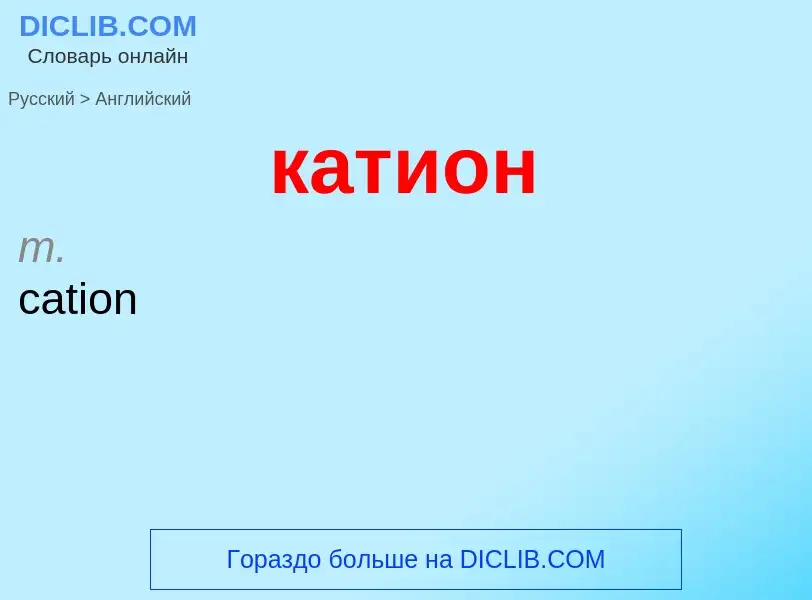Enter a word or phrase in any language 👆
Language:
Translation and analysis of words by ChatGPT artificial intelligence
On this page you can get a detailed analysis of a word or phrase, produced by the best artificial intelligence technology to date:
- how the word is used
- frequency of use
- it is used more often in oral or written speech
- word translation options
- usage examples (several phrases with translation)
- etymology
катион - translation to English
ПОЛОЖИТЕЛЬНО ЗАРЯЖЕННАЯ ЧАСТИЧКА-ИОН, АТОМ В КОТОРОМ ЭЛЕКТРОНОВ МЕНЬШЕ ЧЕМ ПРОТОНОВ
Катионы; Положительные ионы; Положительный ион
катион
m.
cation
cation
basic ion
катион
cation
ATOM OR MOLECULE IN WHICH THE TOTAL NUMBER OF ELECTRONS IS NOT EQUAL TO THE TOTAL NUMBER OF PROTONS, GIVING THE ATOM A NET POSITIVE OR NEGATIVE ELECTRICAL CHARGE
Cation; Anion; Anionic; Cationic; Ions; Negative ions; Cations; Anions; Ion (physics); Negative atomic ion; Charge (chemistry); Oxo anion; Ion (chemistry); Ion notation; Nonionic; Negative ion; Positive ions; Cathion; Kation; Ionical; Ionic charge; Positive ion; Non-ionic; Free floating electrons; Anions and cations; Cations and anions
['kætaiən]
общая лексика
катион
катионный
существительное
химия
катион
Definition
КАТИОН
(от греч. kation, букв. - идущий вниз), положительно заряженный ион; в электрическом поле (напр., при электролизе) движется к отрицательному электроду (катоду).
Wikipedia
Катион
Катио́н — положительно заряженный ион. Характеризуется величиной положительного электрического заряда: например, NH4+ — однозарядный катион аммония, Ca2+ — двухзарядный катион кальция. В электрическом поле, катионы притягиваются к отрицательному электроду — катоду.
Название происходит от греческого слова «καθιών»: нисходящий, идущий вниз. Термин введён Майклом Фарадеем, в 1834 году.
Examples of use of катион
1. А значит, к этим катионам, как к электровозам, можно прицепить вагончик (к примеру, антиоксидант). Важна именно такая конструкция -- катион плюс антиоксидант, иначе проблему можно было бы решить поглощением большого количества природных антиоксидантов типа витамина Е.



![2NO3-}}). The 3-dimensional shell represents a single arbitrary [[isopotential]]. 2NO3-}}). The 3-dimensional shell represents a single arbitrary [[isopotential]].](https://commons.wikimedia.org/wiki/Special:FilePath/Nitrate-ion-elpot.png?width=200)
